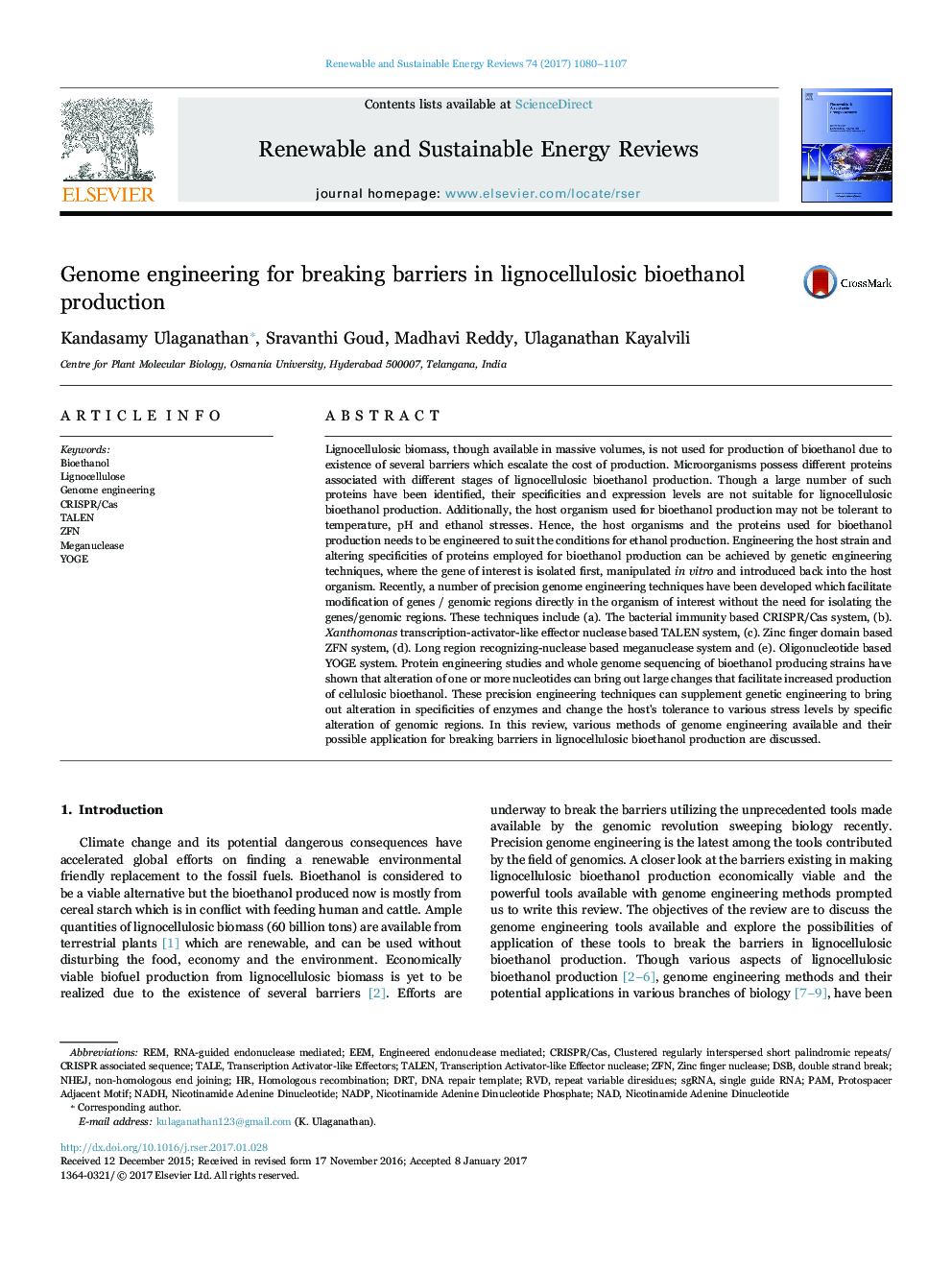| کد مقاله | کد نشریه | سال انتشار | مقاله انگلیسی | نسخه تمام متن |
|---|---|---|---|---|
| 5483177 | 1522312 | 2017 | 28 صفحه PDF | دانلود رایگان |
عنوان انگلیسی مقاله ISI
Genome engineering for breaking barriers in lignocellulosic bioethanol production
ترجمه فارسی عنوان
مهندسی ژنوم برای شکستن موانع تولید بیواتانول لیگنوسلولوزیک
دانلود مقاله + سفارش ترجمه
دانلود مقاله ISI انگلیسی
رایگان برای ایرانیان
کلمات کلیدی
DSBEEMNHEJDRTREMRVDZFNCRISPR/Cas - CRISPR / CASTALE - تلهTranscription activator-like effector nuclease - رونویسی مانند actuator nucleaseTALEN - زبان هاdouble strand break - شکست دو رشتهnon-homologous end joining - عدم پیوستن انتهای غیر همولوگHomologous recombination - نوترکیبی همولوگzinc finger nuclease - نیکلاز انگشت روی
موضوعات مرتبط
مهندسی و علوم پایه
مهندسی انرژی
انرژی های تجدید پذیر، توسعه پایدار و محیط زیست
چکیده انگلیسی
Lignocellulosic biomass, though available in massive volumes, is not used for production of bioethanol due to existence of several barriers which escalate the cost of production. Microorganisms possess different proteins associated with different stages of lignocellulosic bioethanol production. Though a large number of such proteins have been identified, their specificities and expression levels are not suitable for lignocellulosic bioethanol production. Additionally, the host organism used for bioethanol production may not be tolerant to temperature, pH and ethanol stresses. Hence, the host organisms and the proteins used for bioethanol production needs to be engineered to suit the conditions for ethanol production. Engineering the host strain and altering specificities of proteins employed for bioethanol production can be achieved by genetic engineering techniques, where the gene of interest is isolated first, manipulated in vitro and introduced back into the host organism. Recently, a number of precision genome engineering techniques have been developed which facilitate modification of genes / genomic regions directly in the organism of interest without the need for isolating the genes/genomic regions. These techniques include (a). The bacterial immunity based CRISPR/Cas system, (b). Xanthomonas transcription-activator-like effector nuclease based TALEN system, (c). Zinc finger domain based ZFN system, (d). Long region recognizing-nuclease based meganuclease system and (e). Oligonucleotide based YOGE system. Protein engineering studies and whole genome sequencing of bioethanol producing strains have shown that alteration of one or more nucleotides can bring out large changes that facilitate increased production of cellulosic bioethanol. These precision engineering techniques can supplement genetic engineering to bring out alteration in specificities of enzymes and change the host's tolerance to various stress levels by specific alteration of genomic regions. In this review, various methods of genome engineering available and their possible application for breaking barriers in lignocellulosic bioethanol production are discussed.
ناشر
Database: Elsevier - ScienceDirect (ساینس دایرکت)
Journal: Renewable and Sustainable Energy Reviews - Volume 74, July 2017, Pages 1080-1107
Journal: Renewable and Sustainable Energy Reviews - Volume 74, July 2017, Pages 1080-1107
نویسندگان
Kandasamy Ulaganathan, Sravanthi Goud, Madhavi Reddy, Ulaganathan Kayalvili,
